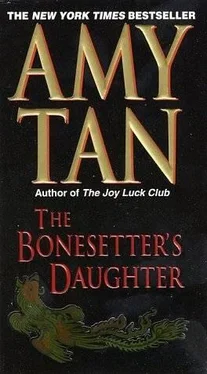Ruth imagined Mrs. Scott taking off her Chanel suit, her trifocals, her diamond-encrusted designer crucifix, then embracing her beach boy.
"She's getting more sex than I am," Wendy exclaimed. "I can't remember the last time I even wanted to do anything in bed with Joe except sleep."
Wendy had often joked about her dwindling sex drive. But Ruth didn't think she meant it was absent. Would this happen to her as well? She and Art were not exactly the red-hot lovers they'd been in earlier years. They prepared less for romance and accepted more readily excuses of fatigue. She wiggled a toe: Get estrogen levels checked. That might be the reason she felt a sense of unease, fluctuating hormones. She had no other reason to feel anxious. Not that her life was perfect, but whatever problems she had, they were small. And she should keep them that way. She vowed to be more affectionate with Art.
"I can see why you're upset," Ruth consoled her.
"Actually, I'm more worried than upset," Wendy said. "It's just weird. It's like the older she gets, the younger she acts. And part of me says, Good for her, you go, girl. And the other part is like, Whoa. Is she crazy or what? Do I have to watch over her now, act like her mother and make sure she doesn't get herself in trouble? You know what I mean?"
"I've been that way with my mother all my life," Ruth said. Suddenly she remembered what had been eluding her. Her mother was supposed to see the doctor at four this afternoon. Over the past year, Ruth had been vaguely worried about her mother's health. Nothing was terribly wrong; it was just that LuLing seemed slightly off, hazy. For a while, Ruth had reasoned that her mother was tired, that her hearing might be going, or that her English was getting worse. As a precaution, Ruth had also gnawed over the worst possibilities-brain tumor, Alzheimer's, stroke- believing this would ensure that it was not these things. History had always proven that she worried for nothing. But a few weeks before, when her mother mentioned she had an appointment for a checkup, Ruth said she would drive her.
After she and Wendy finished their conversation, Ruth stepped out of the car and walked toward the grocery store, still thinking. Nine, Mom's doctor. And she started to count on her ringers the questions she should ask the doctor. Thank God she could speak once again.
In the vegetable aisle, Ruth headed toward a bin of beautifully shaped turnips. They were each the size of apples, symmetrical and scrubbed, with striations of purple. Most people did not appreciate the aesthetics of turnips, Ruth thought as she chose five good ones, whereas she loved them, their crunchiness, the way they absorbed the flavor of whatever they were immersed in, gravy or pickling juice. She loved cooperative vegetables. And she loved turnips best when they were sliced into wedges and preserved in vinegar and chilies, sugar and salt.
Every year, before their family reunion dinner in September, her mother started two new fermenting jars of spicy turnips, one of which she gave to Ruth. When Ruth was a little girl, she called them la-la, hot-hot. She would suck and munch on them until her tongue and lips felt inflamed and swollen. She still gorged on them from time to time. Was it a craving for salt, or for pain? When the supply grew low, Ruth would toss in more chopped-up turnips and a pinch of salt, and let them pickle for a few days. Art thought the taste was okay in small doses. But the girls said they smelled like "something farted in the fridge." At times Ruth secretly ate the spicy turnips in the morning, her way of seizing the day. Even her mother considered that strange.
Her mother-and Ruth tapped her ring finger to remind herself again of the doctor's appointment. Four o'clock. She had to squeeze a lot of work into the shortened day. She hurried, grabbing Fuji apples for Fia, Granny Smiths for Dory, Braeburns for Art.
At the meat counter, she evaluated the options. Dory would not eat anything with eyes, and ever since seeing that pig movie Babe, Fia had been trying to be a vegetarian. Both girls made an exception for fish, because seafood was "not cute." When they announced that, Ruth said to them, "Just because something isn't cute, is its life worth less? If a girl wins a beauty contest, is she better than a girl who doesn't?" And Fia scrunched up her face and replied: "What are you talking about? Fish don't enter beauty contests."
Ruth now pushed her cart toward the fish counter. She longed for prawns in the shell, always her first choice. Art wouldn't eat them, however. He claimed that the predominant taste of any crustacean or mollusk was that of its alimentary tract. She settled on Chilean sea bass. "That one," she told the man at the counter. Then she reconsidered: "Actually, give me the bigger one." She might as well ask her mother to dinner, since they were already going to the doctor's together. LuLing was always complaining she didn't like to cook for just herself.
At the checkout counter, Ruth saw a woman in front of her scoop up bunches of ivory- and peach-colored tulips, at least fifty dollars' worth. Ruth was amazed at how some people casually bought flowers as household staples, as if they were as necessary as toilet paper. And tulips, of all choices! They wilted and dropped their petals after a few days. Was the woman having an important dinner party on a weeknight? When Ruth bought flowers, she had to assess their value in several ways to justify what she bought. Daisies were cheerful and cheap, but they had an unpleasant smell. Baby's breath was even cheaper, but as Gideon pointed out, it was the lowest of floral low taste, what old queens used, along with lace doilies they inherited from their grandmothers. Tuberoses smelled wonderful and gave an architectural touch, but they were expensive at this store, nearly four dollars a stalk. At the flower mart, they were only a dollar. She liked hydrangeas in a pot. They were making a comeback, and while they cost a lot, they lasted a month or two, if you remembered to water them. The trick was to cut them before they died, then let them dry in a pottery pitcher, so you could keep them as a permanent floral arrangement, that is, until someone like Art threw them out, citing that they were already dead.
Ruth had not grown up with flowers in the house. She could not remember LuLing ever buying them. She had not thought this a deprivation until the day she went grocery shopping with Auntie Gal and her cousins. At the supermarket in Saratoga, ten-year-old Ruth had watched as they dumped into the cart whatever struck their fancy at the moment, all kinds of good things Ruth was never allowed to eat: chocolate milk, doughnuts, TV dinners, ice cream sandwiches, Hostess Twinkles. Later they stopped at a little stand where Auntie Gal bought cut flowers, pink baby roses, even though nobody had died or was having a birthday.
Remembering this, Ruth decided to splurge and buy a small orchid plant with ivory blooms. Orchids looked delicate but thrived on neglect. You didn't have to water them but once every ten days. And while they were somewhat pricey, they bloomed for six months or more, then went dormant before surprising you with new blooms all over again. They never died-you could count on them to reincarnate themselves forever. A lasting value.
Back at the flat, Ruth put the groceries away, set the orchid on the dining room table, and went into the Cubbyhole. She liked to think that limited space inspired limitless imagination. The walls were painted red with flecks of metallic gold, Wendy's idea. The overhead light was softened by a desk lamp with an amber mica shade. On the lacquer-black shelves were reference books instead of jars of jam. A pull-out cutting board held her laptop, a flour bin had been removed for knee space.
Читать дальше












